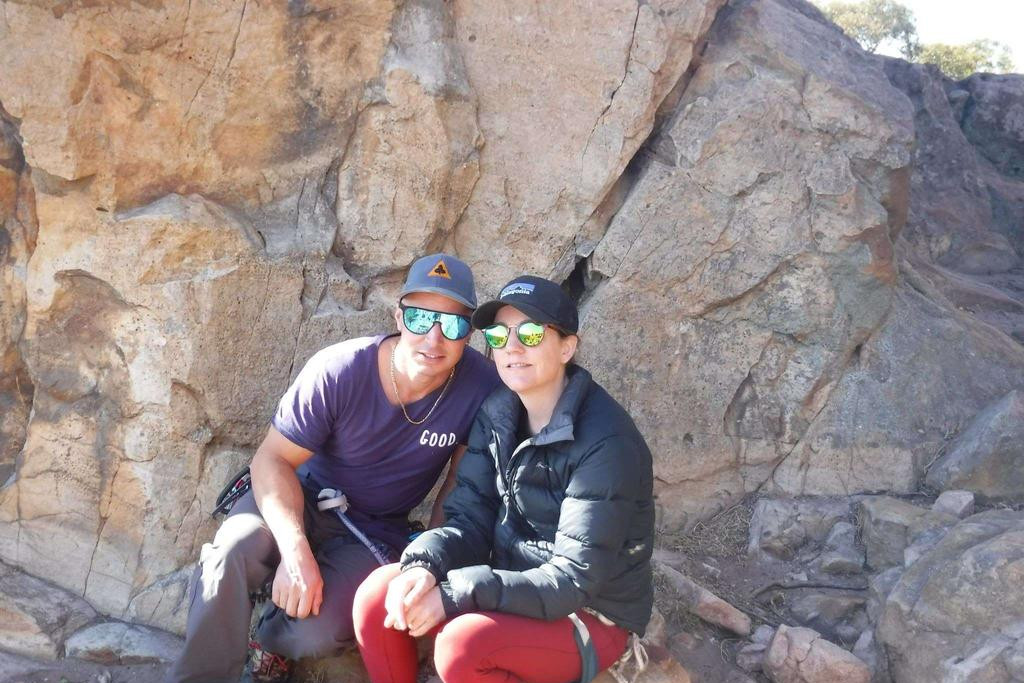General News
29 November, 2024
Perfect storm of challenges
Luke and Penny Weatherstone bought into Natimuk in 2019, with a plan to transform what remained of the former Kiefels general store into a comfortable family residence.

Both climbers, the Weatherstones chose the town for its proximity to the 3,300 climbing routes that could be accessed on foot.
While working in Sydney, they intended initially to create a house in Natimuk for semi-regular use by themselves and their two children.
"We're a family of four who travel together and climb," Mr Weatherstone said.
"I've been climbing since 1999 and Mt Arapiles was just the best place to climb that I'd ever seen."
"I wanted my kids to enjoy it more frequently than I did when I was younger, and we had aspirations to then move to Natimuk later in life once they'd finished high school."
The original 1887 shop building had been all but destroyed by fire four years earlier, leaving the couple with a mammoth renovation challenge.
They were exactly one month short of receiving planning permission for the project, when COVID struck, stranding Natimuk – like the rest of Victoria – in what felt at the time like an endless cycle of rolling lockdowns.
Managing the rebuild remotely while holding down their day jobs as a power systems electrician and a hospital theatre manager, devoured the Weatherstones' budget, and then some.
"It ended up costing us so much to renovate, that we thought the only way we could recoup our money was to rent it out as an Airbnb," Mr Weatherstone said.
In 2023 the restoration was finally complete and Arapiles Club House and its associated studio cabin, Arapiles Crash Pad, opened their doors to the travelling public, providing luxury short stays.
Since then the Weatherstones have enjoyed promoting not only their own operation, but also the wider district, as far afield as Horsham, introducing customers to their website with the message 'Welcome to Climbing Country'.
The dramatic reduction in routes is exactly what, the still relatively new business, does not need right now, coming hot on the heels of a global pandemic and the Victorian Government's decision to charge a levy of 7.5 per cent on all short-term accommodation from January 1 next year.
Having invested more than half a million dollars in bricks and mortar in Natimuk, the Weatherstones now have not only a longstanding emotional tie to the community, but an enormous capital stake in it as well.
"Financially, we're probably going to suffer significantly if the bans are to become permanent,“ Mr Weatherstone said.
The overwhelming majority of the Weatherstones' guests are climbers: 90-95 per cent of those who book the studio and about 70 per cent in the case of the four-bedroom house.
Mr Weatherstone said he feared that irreversible damage was being done to the district's climbing reputation right now.
"The numbers started dropping off from the moment they announced this, when people heard the first piece of news," he said.
"If we look at the rock-climbing bans in the Grampians, for example, those bans were very knee-jerk and over-the-top, like this was, and they later had to backtrack and undo some of the bans to make it more digestible by the wider community.
"But, that initial shock sent shockwaves around the world.
"Bad news tends to travel faster and wider than a good-news story, and people still assume even now that climbing in the Grampians is banned, even though it's not really.
"I fear that this mentality, which is part of being human, is going to affect Mr Arapiles as well: this will be a carbon copy.
"People are hearing about it – it's all over the news – but there's not going to be a big news story later to announce that it's open again.
"This is the thing that will affect the longevity of the town of Natimuk.
"If people don't make noise about this now, there'll be no huge ribbon-cutting annoucement of what's still open."
Mr Weatherstone said climbers went so far as to contribute to the upkeep of Mt Arapiles-Tooan by regularly weeding in the state park and doing track maintainece.
Mr Weatherstone says he and his family are certainly not against moving to preserve Indigenous culture where appropriate – quite the contrary, in fact.
"My wife has worked in Aboriginal camps as a nurse and also worked with the Flying Doctors visiting remote communities ," Mr Weatherstone said.
"She fully understands and sympathises with the Aboriginal community."
Mr Weatherstone said his knowledge of Mt Arapiles' Indigenous rock art left him questioning what was going to be protected.
"We're reluctant to promote Mt Arapiles as a historical cultural heritage site," he said.
"If you look at other significant rock art overseas or in Australia, it's really good.
"However, the art of Mt Arapiles does not appear to be of the same significance.
"A lot of it's invisible and the quality of the artwork is not going to be a huge drawcard for tourists.
"It would be a lie to drag people out from Melbourne or wherever they're from to see this Aboriginal rock art, because there's nothing substantial to show them.
"I like Aboriginal rock art and any attraction in the area is a bonus for me and for all businesses in the area – I'm not in the business of knocking back tourist attractions."
"But, personally, I would not be comfortable advertising Aboriginal rock art at Mt Arapiles on our website because of its poor quality."